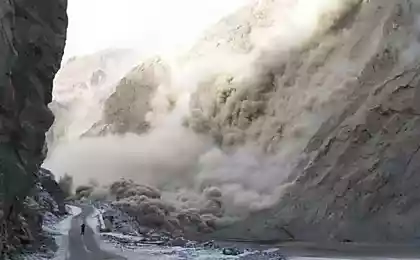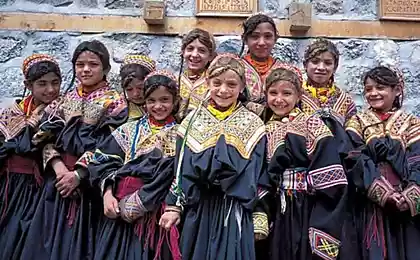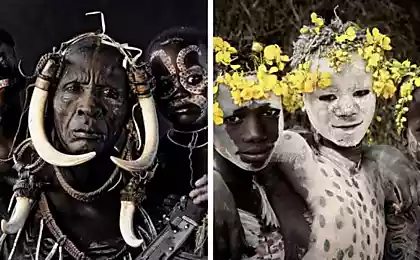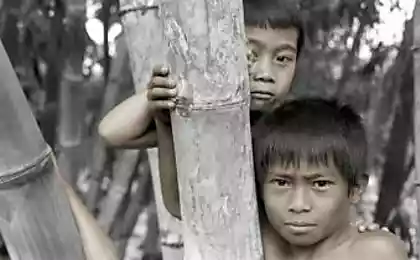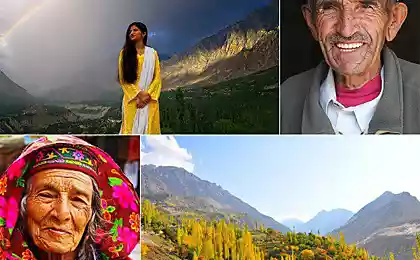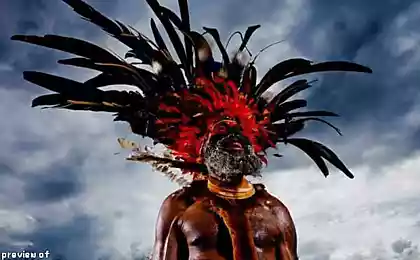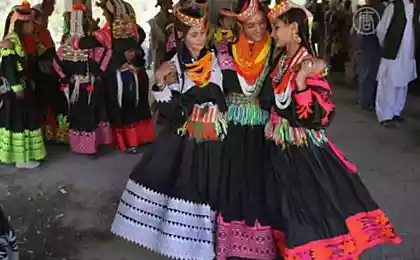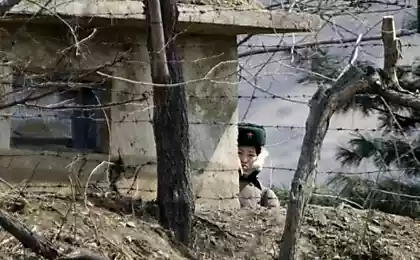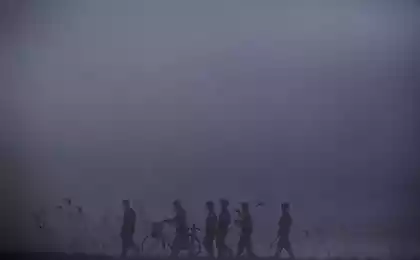632
The valley of the river Hunza — an oasis of eternal youth
The valley of the Hunza river (the border of India and Pakistan), called the “oasis of youth”. The life expectancy of the inhabitants of this valley — 110-120 years. They almost never get sick, look young.
So there is a certain way of life, approaching the ideal, when people feel healthy, happy, do not grow old, as in other countries, by 40-50 years of age. It is curious that the residents of Hunza valley, in contrast to the neighboring peoples, look very similar to Europeans (as the Kalash who live very close).
According to legend, located here dwarf highland state was founded by a group of soldiers of the army of Alexander the great during his Indian campaign. Naturally, they installed strict military discipline is such that residents with swords and shields and had to sleep and eat and even dance...
While hunzakut with a touch of irony relate to the fact that someone else in the world are called the highlanders. Well, in fact, it is not obvious that rightfully this name should only be those who live near the famous "place of the mountain of the meeting — point where three of the higher system of the world: the Himalayas, Hindu Kush and Karakorum. Of the 14 peaks of the Earth eight thousand five are nearby, including the second after Everest K2 (8 611 meters), the rise of which in the mountaineering community is valued even more than the conquest of Chomolungma. But what about the not less famous local "top killer" Nanga Parbat (8 126 m), buried a record number of climbers? And the tens seven and shestidesyatnikov, literally "crowding" around the Hunza?
Go through these rock formations will not do, if you are a world-class athlete. You can only "leak" narrow passes, gorges, paths. Since ancient times, these rare artery was controlled by principalities, which were imposed a significant duty on all passing caravans. Hunza was considered among them one of the most influential.
In distant Russia about this "lost world" is little known, and for reasons not only geographical but also political: Hunza, along with some other valleys of the Himalayas, was on the territory for which almost 60 years are furious dispute, India and Pakistan (the main subject is far more extensive Kashmir).
USSR — away from sin — always tried to distance themselves from the conflict. For example, in most of the Soviet dictionaries and encyclopedias the same K2 (another name is Chogori) is mentioned, but without specifying the area in which it is located. Here, it is quite traditional names were erased and Soviet maps, and, consequently, of the Soviet news lexicon.
But what is surprising: in Hunza about Russia as if you know everything.
TWO CAPTAINS
"Lock" many local people respectfully call Baltisky Fort, the overhanging cliff above Karimabad. He's about 700 years and at one time he served as an independent local ruler and the peace Palace, and fortress. Not devoid of solemnity inside Baltit seem bleak and raw. The dimly lit space and the poor conditions — the usual pots, spoons, a giant oven... In one of the rooms in a floor hatch under him the world (Prince) the Hunza have kept their personal captives. Bright and large rooms a little, perhaps, only "balcony room" makes a good impression — it offers a magnificent view of the valley. On one wall of this room collection of antique musical instruments, other weapons: sabers, swords. The sword, donated by the Russian.
In one room hangs two portraits: captain Angasana British and Russian capitalarticle, which decided the fate of the Principality. In 1888 at the junction of the Karakoram and the Himalayas almost a Russian village when the then world, the Hunza Safdar Ali arrived with the mission of Russian officer Bronislaw Grabczewski. Then on the border of the Indian subcontinent and Central Asia was a Great Game, active confrontation of the two superpowers of the nineteenth century, Russia and great Britain. Not only military, but also a scientist, and later even an honorary member of the Imperial geographical society, this man was not going to conquer for their king of the earth. And it was with him then just six Cossacks. But all the same it was a speedy device trading posts and political Union. Russia, which had by that time, the impact on the Pamir, turned his gaze now to the Indian goods. So the captain came into the Game.
Safdar very warmly received him and willingly entered into the proposed agreement — he feared the charging from the South of England.
And, as it turned out, not without reason. Mission Grachevskogo not a little alarmed Calcutta, where at that time was the yard of the Viceroy of British India. And although the special commissioners and the spies reassured of power: it is hardly necessary to fear the emergence of Russian troops in "the crown of India — from North to Hunza are too difficult passes, moreover, closed by snow most of the year, here it was decided to urgently send a detachment under the command of Francis Angasana.
Both captains were fellow geographers in uniform," they often met in the Pamir expeditions. Now they had to determine the future of orphan hunzakuts bandits" as they were called in Calcutta.
In Hunza, meanwhile, slowly appeared Russian goods, weapons, and in the Palace, Baltit there was even a formal portrait of Alexander III. Distant highland government began diplomatic correspondence with St. Petersburg and offered to host a Cossack garrison. And in 1891 from Hunza came the message: the world Safdar Ali formally asks for admission with all the people in the Russian citizenship. This news soon reached Calcutta, as a result, 1 Dec 1891 Angasana mountain brigade seized the Principality, Safdar Ali fled to Xinjiang. "The door to India for the king slammed," wrote the British occupier to the Viceroy.
So, the Russian territory of Hunza considered himself only four days. The ruler of hunzakuts wished to see himself as a Russian, but the official answer has not managed to get. And the British entrenched and held there until 1947, when during the collapse of the gained independence of British India, the Principality suddenly appeared on the territory controlled by the Muslims.
Today Hunza is controlled by Pakistan's Ministry of Kashmir Affairs and Northern areas, but the warm memory of the failed outcome of the Big Game, remained.
Moreover, the locals sprashivaut among Russian tourists, why are so few tourists from Russia. The British, though it took almost 60 years ago, still have them hippies flooded the area.
APRICOT HIPPIES
It is believed that the Hunza again to the West opened exactly a hippie who wandered in the 1970-ies to Asia in search of truth and exotics. Moreover, popularized this place so much that even ordinary apricots today Americans call Hunza Apricot. However, here the "flower children" were attracted not only these two categories, but Indian hemp.
One of the main attractions of Hunza — glacier, which wide cold river descends into the valley. However, the numerous terraced fields grow potatoes, vegetables and hemp, which is not so much smoke as to add as seasoning to meat dishes and soups.
As for the young long-haired guys with the inscription Hippie way t-shirts — whether these hippies, or fans of retro — that they Karimabadi and basically was eating apricots. This, of course, the main value hunzakuts gardens. All Pakistan knows that only grow here "Han fruit", which is oozing fragrant juice still on the trees.
Hunza attractive not only for radical youth — they come here and lovers of mountain travel and history buffs, and lovers to get away from home. Complete the picture, of course, numerous climbers...
Because the valley is halfway from Hungariantogo pass before the start of the Indian plains, hunzakut sure what control path at all in the "upper world". In the mountains, as such. It's hard to say whether this Principality was once founded by the soldiers of Alexander the Great, or was it the Bactrians — Aryan descendants of the once United the great Russian people, but some mystery about the appearance of this small and distinctive in their environment of people, of course. He says in his own language burushaski (Burushaski, which relationship is still not established with any of the languages of the world, even though everyone here knows Urdu, and many — English professes, of course, like most Pakistanis, Islam, but special wing, namely Ismaili, one of the most mystical and mysterious in religion that professes to 95% of the population. Therefore, in Hunza you will not hear the usual call to prayer, rushing out of the speakers of the minarets. All quiet prayer is a private matter and time of each.
HEALTH
The Hunza bathe in icy water even at 15 degree frost, up to a hundred years playing outdoor games, 40-year-old woman they look like girls, 60 years to maintain the harmony and elegance of the figures, and in 65 years have children. In the summer they eat raw fruits and vegetables in the winter — sun-dried apricots and sprouted beans, feta cheese.
The Hunza river was a natural barrier to the two medieval principalities of Hunza and Nagar. From the XVII century these principalities were constantly at war, stealing each other's women and children and sold into slavery. And they both lived in fortified villages. Another interesting people have a period when fruits are not yet ripe — it's called "hungry spring" and lasts from two to four months. In these months they almost nothing to eat and only once a day drink a drink made from dried apricots. This post is built into the cult and strictly observed.
A Scottish physician, Mccarrison the first to describe Happy valley, emphasized that the consumption of protein there is on the lower level, if at all it can be called the norm. Daily calorie Hunza averages 1933 kcal and includes 50 g of protein, 36 grams of fat and 365 carbohydrates.
The Scot lived in the vicinity of the Hunza valley for 14 years. He came to the conclusion that diet is a major factor in the longevity of this nation. If the person eats properly, then diseases will not save him and the mountain climate. It is therefore not surprising that the neighbours Hunza, living in the same climatic conditions, suffer a variety of diseases. Their life expectancy is two times shorter.
Mac Carrison, returning to England, put interesting experiments on a large number of animals. Some of them were fed a normal diet of London working-class family (white bread, herring, refined sugar, canned and cooked vegetables). Eventually this group began to appear a variety of human diseases." Other animals were on a diet of Hunza and throughout the experience remained perfectly healthy.
In the book "Hunza — people who do not know the disease" R. Bircher emphasizes the following very substantial advantages of the model of power in this country:
— first of all it vegetarian;
— a large number of raw foods;
in the daily diet is dominated by vegetables and fruits;
— the products are natural, without any chemicals and made with preservation of all biologically valuable substances;
— alcohol and treats only consume rarely.
very moderate consumption of salt, the food grown only in his native soil;
— regular periods of fasting.
To this we must add other factors that favor healthy longevity. But the way nutrition is undoubtedly very important, crucial.
In 1963, in Hunza visited the French medical expedition. As a result of the population census, it was found that the average life expectancy of hunzakuts is 120 years, twice the rate among Europeans. In August 1977 in Paris international cancer Congress, a statement was made: "In accordance with the data of geoontologies (science for the study of cancer in different regions of the world) the complete absence of cancer is only among the peoples of Hunza".
In April 1984, one of Hong Kong Newspapers have reported the following amazing case. One of hunzakuts named Sayid Abdul Mabut arrived at London's Heathrow airport, has led to the bewilderment of employees of the immigration service when he produced his passport. In accordance with the document, hunzakut was born in 1823 and he was 160 years old. Accompanying Moboda Mullah said that his client considered Holy in the country of Hunza, famous for its centenarians. Moboda excellent health and sanity. He remembers events since 1850.
About his secret of longevity of the local residents say just be vegetarian, work always and physically, constantly move and don't change the rhythm of life, and then live up to 120-150 years. The distinctive features of Huns as a nation with "full health":
1) High working ability in the broad sense of the word. The Hunza this is manifested as the ability to work during work and during dances and games. For them to go 100-200 miles — is like for us to take a short walk near the house. They are extremely easy to climb up a steep mountain to pass some news, and come home fresh and cheerful.
2) Cheerfulness. The Hunza constantly laughing, they are always in a good mood, even if you are hungry and suffering from the cold.
3) Exceptional durability. "Hunza nerves strong as ropes, and thin and delicate, like a string, wrote, Maccaroon.— They never get angry and do not complain, do not get nervous and do not show impatience, do not quarrel among themselves and with total peace of mind suffer physical pain, trouble, noise, etc.
istochnikami
Source: /users/1077
So there is a certain way of life, approaching the ideal, when people feel healthy, happy, do not grow old, as in other countries, by 40-50 years of age. It is curious that the residents of Hunza valley, in contrast to the neighboring peoples, look very similar to Europeans (as the Kalash who live very close).
According to legend, located here dwarf highland state was founded by a group of soldiers of the army of Alexander the great during his Indian campaign. Naturally, they installed strict military discipline is such that residents with swords and shields and had to sleep and eat and even dance...
While hunzakut with a touch of irony relate to the fact that someone else in the world are called the highlanders. Well, in fact, it is not obvious that rightfully this name should only be those who live near the famous "place of the mountain of the meeting — point where three of the higher system of the world: the Himalayas, Hindu Kush and Karakorum. Of the 14 peaks of the Earth eight thousand five are nearby, including the second after Everest K2 (8 611 meters), the rise of which in the mountaineering community is valued even more than the conquest of Chomolungma. But what about the not less famous local "top killer" Nanga Parbat (8 126 m), buried a record number of climbers? And the tens seven and shestidesyatnikov, literally "crowding" around the Hunza?
Go through these rock formations will not do, if you are a world-class athlete. You can only "leak" narrow passes, gorges, paths. Since ancient times, these rare artery was controlled by principalities, which were imposed a significant duty on all passing caravans. Hunza was considered among them one of the most influential.
In distant Russia about this "lost world" is little known, and for reasons not only geographical but also political: Hunza, along with some other valleys of the Himalayas, was on the territory for which almost 60 years are furious dispute, India and Pakistan (the main subject is far more extensive Kashmir).
USSR — away from sin — always tried to distance themselves from the conflict. For example, in most of the Soviet dictionaries and encyclopedias the same K2 (another name is Chogori) is mentioned, but without specifying the area in which it is located. Here, it is quite traditional names were erased and Soviet maps, and, consequently, of the Soviet news lexicon.
But what is surprising: in Hunza about Russia as if you know everything.
TWO CAPTAINS
"Lock" many local people respectfully call Baltisky Fort, the overhanging cliff above Karimabad. He's about 700 years and at one time he served as an independent local ruler and the peace Palace, and fortress. Not devoid of solemnity inside Baltit seem bleak and raw. The dimly lit space and the poor conditions — the usual pots, spoons, a giant oven... In one of the rooms in a floor hatch under him the world (Prince) the Hunza have kept their personal captives. Bright and large rooms a little, perhaps, only "balcony room" makes a good impression — it offers a magnificent view of the valley. On one wall of this room collection of antique musical instruments, other weapons: sabers, swords. The sword, donated by the Russian.
In one room hangs two portraits: captain Angasana British and Russian capitalarticle, which decided the fate of the Principality. In 1888 at the junction of the Karakoram and the Himalayas almost a Russian village when the then world, the Hunza Safdar Ali arrived with the mission of Russian officer Bronislaw Grabczewski. Then on the border of the Indian subcontinent and Central Asia was a Great Game, active confrontation of the two superpowers of the nineteenth century, Russia and great Britain. Not only military, but also a scientist, and later even an honorary member of the Imperial geographical society, this man was not going to conquer for their king of the earth. And it was with him then just six Cossacks. But all the same it was a speedy device trading posts and political Union. Russia, which had by that time, the impact on the Pamir, turned his gaze now to the Indian goods. So the captain came into the Game.
Safdar very warmly received him and willingly entered into the proposed agreement — he feared the charging from the South of England.
And, as it turned out, not without reason. Mission Grachevskogo not a little alarmed Calcutta, where at that time was the yard of the Viceroy of British India. And although the special commissioners and the spies reassured of power: it is hardly necessary to fear the emergence of Russian troops in "the crown of India — from North to Hunza are too difficult passes, moreover, closed by snow most of the year, here it was decided to urgently send a detachment under the command of Francis Angasana.
Both captains were fellow geographers in uniform," they often met in the Pamir expeditions. Now they had to determine the future of orphan hunzakuts bandits" as they were called in Calcutta.
In Hunza, meanwhile, slowly appeared Russian goods, weapons, and in the Palace, Baltit there was even a formal portrait of Alexander III. Distant highland government began diplomatic correspondence with St. Petersburg and offered to host a Cossack garrison. And in 1891 from Hunza came the message: the world Safdar Ali formally asks for admission with all the people in the Russian citizenship. This news soon reached Calcutta, as a result, 1 Dec 1891 Angasana mountain brigade seized the Principality, Safdar Ali fled to Xinjiang. "The door to India for the king slammed," wrote the British occupier to the Viceroy.
So, the Russian territory of Hunza considered himself only four days. The ruler of hunzakuts wished to see himself as a Russian, but the official answer has not managed to get. And the British entrenched and held there until 1947, when during the collapse of the gained independence of British India, the Principality suddenly appeared on the territory controlled by the Muslims.
Today Hunza is controlled by Pakistan's Ministry of Kashmir Affairs and Northern areas, but the warm memory of the failed outcome of the Big Game, remained.
Moreover, the locals sprashivaut among Russian tourists, why are so few tourists from Russia. The British, though it took almost 60 years ago, still have them hippies flooded the area.
APRICOT HIPPIES
It is believed that the Hunza again to the West opened exactly a hippie who wandered in the 1970-ies to Asia in search of truth and exotics. Moreover, popularized this place so much that even ordinary apricots today Americans call Hunza Apricot. However, here the "flower children" were attracted not only these two categories, but Indian hemp.
One of the main attractions of Hunza — glacier, which wide cold river descends into the valley. However, the numerous terraced fields grow potatoes, vegetables and hemp, which is not so much smoke as to add as seasoning to meat dishes and soups.
As for the young long-haired guys with the inscription Hippie way t-shirts — whether these hippies, or fans of retro — that they Karimabadi and basically was eating apricots. This, of course, the main value hunzakuts gardens. All Pakistan knows that only grow here "Han fruit", which is oozing fragrant juice still on the trees.
Hunza attractive not only for radical youth — they come here and lovers of mountain travel and history buffs, and lovers to get away from home. Complete the picture, of course, numerous climbers...
Because the valley is halfway from Hungariantogo pass before the start of the Indian plains, hunzakut sure what control path at all in the "upper world". In the mountains, as such. It's hard to say whether this Principality was once founded by the soldiers of Alexander the Great, or was it the Bactrians — Aryan descendants of the once United the great Russian people, but some mystery about the appearance of this small and distinctive in their environment of people, of course. He says in his own language burushaski (Burushaski, which relationship is still not established with any of the languages of the world, even though everyone here knows Urdu, and many — English professes, of course, like most Pakistanis, Islam, but special wing, namely Ismaili, one of the most mystical and mysterious in religion that professes to 95% of the population. Therefore, in Hunza you will not hear the usual call to prayer, rushing out of the speakers of the minarets. All quiet prayer is a private matter and time of each.
HEALTH
The Hunza bathe in icy water even at 15 degree frost, up to a hundred years playing outdoor games, 40-year-old woman they look like girls, 60 years to maintain the harmony and elegance of the figures, and in 65 years have children. In the summer they eat raw fruits and vegetables in the winter — sun-dried apricots and sprouted beans, feta cheese.
The Hunza river was a natural barrier to the two medieval principalities of Hunza and Nagar. From the XVII century these principalities were constantly at war, stealing each other's women and children and sold into slavery. And they both lived in fortified villages. Another interesting people have a period when fruits are not yet ripe — it's called "hungry spring" and lasts from two to four months. In these months they almost nothing to eat and only once a day drink a drink made from dried apricots. This post is built into the cult and strictly observed.
A Scottish physician, Mccarrison the first to describe Happy valley, emphasized that the consumption of protein there is on the lower level, if at all it can be called the norm. Daily calorie Hunza averages 1933 kcal and includes 50 g of protein, 36 grams of fat and 365 carbohydrates.
The Scot lived in the vicinity of the Hunza valley for 14 years. He came to the conclusion that diet is a major factor in the longevity of this nation. If the person eats properly, then diseases will not save him and the mountain climate. It is therefore not surprising that the neighbours Hunza, living in the same climatic conditions, suffer a variety of diseases. Their life expectancy is two times shorter.
Mac Carrison, returning to England, put interesting experiments on a large number of animals. Some of them were fed a normal diet of London working-class family (white bread, herring, refined sugar, canned and cooked vegetables). Eventually this group began to appear a variety of human diseases." Other animals were on a diet of Hunza and throughout the experience remained perfectly healthy.
In the book "Hunza — people who do not know the disease" R. Bircher emphasizes the following very substantial advantages of the model of power in this country:
— first of all it vegetarian;
— a large number of raw foods;
in the daily diet is dominated by vegetables and fruits;
— the products are natural, without any chemicals and made with preservation of all biologically valuable substances;
— alcohol and treats only consume rarely.
very moderate consumption of salt, the food grown only in his native soil;
— regular periods of fasting.
To this we must add other factors that favor healthy longevity. But the way nutrition is undoubtedly very important, crucial.
In 1963, in Hunza visited the French medical expedition. As a result of the population census, it was found that the average life expectancy of hunzakuts is 120 years, twice the rate among Europeans. In August 1977 in Paris international cancer Congress, a statement was made: "In accordance with the data of geoontologies (science for the study of cancer in different regions of the world) the complete absence of cancer is only among the peoples of Hunza".
In April 1984, one of Hong Kong Newspapers have reported the following amazing case. One of hunzakuts named Sayid Abdul Mabut arrived at London's Heathrow airport, has led to the bewilderment of employees of the immigration service when he produced his passport. In accordance with the document, hunzakut was born in 1823 and he was 160 years old. Accompanying Moboda Mullah said that his client considered Holy in the country of Hunza, famous for its centenarians. Moboda excellent health and sanity. He remembers events since 1850.
About his secret of longevity of the local residents say just be vegetarian, work always and physically, constantly move and don't change the rhythm of life, and then live up to 120-150 years. The distinctive features of Huns as a nation with "full health":
1) High working ability in the broad sense of the word. The Hunza this is manifested as the ability to work during work and during dances and games. For them to go 100-200 miles — is like for us to take a short walk near the house. They are extremely easy to climb up a steep mountain to pass some news, and come home fresh and cheerful.
2) Cheerfulness. The Hunza constantly laughing, they are always in a good mood, even if you are hungry and suffering from the cold.
3) Exceptional durability. "Hunza nerves strong as ropes, and thin and delicate, like a string, wrote, Maccaroon.— They never get angry and do not complain, do not get nervous and do not show impatience, do not quarrel among themselves and with total peace of mind suffer physical pain, trouble, noise, etc.
istochnikami
Source: /users/1077
7 experiments that prove how little we know about ourselves
13% of British cats have their own Facebook page
